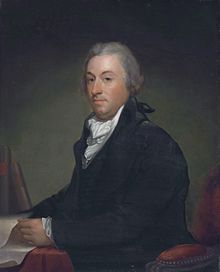Robert R. Livingston (chancellor)
| Robert Livingston | |
|---|---|
 |
|
| United States Minister to France | |
|
In office 1801–1804 |
|
| Appointed by | Thomas Jefferson |
| Preceded by | Charles Pinckney |
| Succeeded by | John Armstrong |
| 1st United States Secretary of Foreign Affairs | |
|
In office October 20, 1781 – June 4, 1783 |
|
| Preceded by | Position established |
| Succeeded by | John Jay |
| 1st Chancellor of New York | |
|
In office July 30, 1777 – June 30, 1801 |
|
| Governor |
George Clinton John Jay |
| Preceded by | Position established |
| Succeeded by | John Lansing |
| Personal details | |
| Born |
November 27, 1746 New York City, New York, British America |
| Died | February 26, 1813 (aged 66) Clermont, New York, U.S. |
| Political party | Democratic-Republican |
| Spouse(s) | Mary Stevens Livingston |
| Alma mater | Columbia University |
Robert R(obert) Livingston (November 27, 1746 (Old Style November 16) – February 26, 1813) was an American lawyer, politician, diplomat from New York, and a Founding Father of the United States. He was known as "The Chancellor", after the high New York state legal office he held for 25 years. He was a member of the Committee of Five that drafted the Declaration of Independence, along with Thomas Jefferson, Benjamin Franklin, John Adams, and Roger Sherman.
Livingston was the eldest son of Judge Robert Livingston (1718-1775) and Margaret Beekman Livingston, uniting two wealthy Hudson River valley families. He had nine brothers and sisters, all of whom wed and made their homes on the Hudson River near the family seat at Clermont Manor. Livingston graduated from King's College, the predecessor to today's Columbia University, in 1764.
Livingston married Mary Stevens, daughter of Continental Congressman John Stevens, on September 9, 1770, and built a home for himself and his wife south of Clermont, called Belvedere, which was burned to the ground along with Clermont in 1777 by the British Army under General John Burgoyne. In 1794 he built a new home called New Clermont, which was subsequently renamed Arryl House – a phonetic spelling of his initials, "RRL" – which was deemed "the most commodious home in America" and contained a library of four thousand volumes. Livingston was known for continually quarreling with his relatives.
Livingston was appointed Recorder of New York City in October 1773, but soon identified himself with the anti-colonial Whig Party and was replaced a few months later with John Watts, Jr. He was a member of the Committee of Five that drafted the Declaration of Independence, although he was recalled by his state before he could sign the final version of the document.
...
Wikipedia
